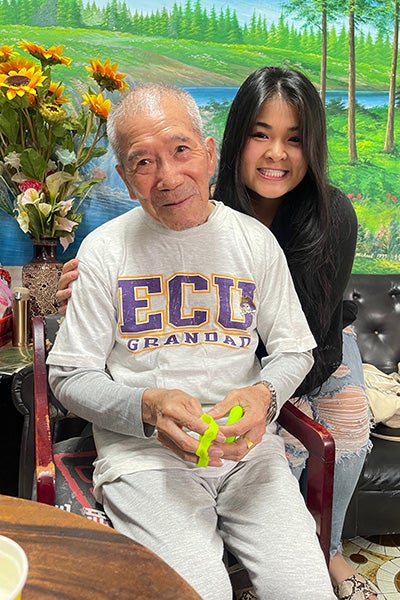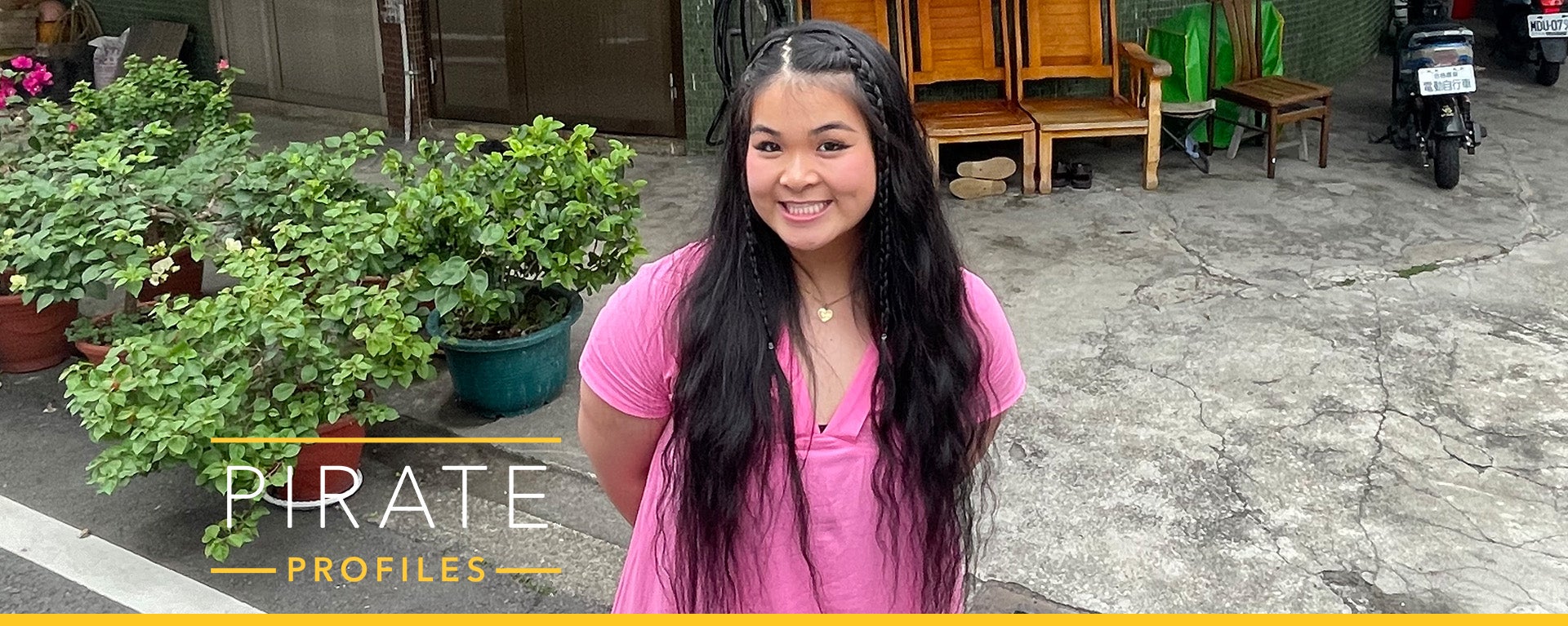Student: Bonnie Chen
Bonnie Chen was too little, just weeks old, to remember leaving Taiwan for North Carolina. She has returned back to visit her family nearly every year since because family is important to her. Community is important.
Chen chose East Carolina University for all the right reasons: it’s close to her home in Cary, it has one of the best nursing programs in the state and the scholarship that came with acceptance into the Honors College didn’t hurt.
Nursing runs in Chen’s family. During a high school break, Chen’s recently retired nurse aunt secured her an internship at the hospital where she was born. She still marvels at the differences between nursing care in Taiwan and the United States that she observed during the internship.
Transportation is difficult for many of Taiwan’s elderly. As a nursing assistant in a small village in Taiwan, she was part of a team of health care professionals who made house calls and met patients where they lived. Where patient education in the States often occurs at the hospital bedside or in a clinical setting, in Taiwan Chen experienced nursing care diffused into communities.

Chen poses with her grandfather in Taiwan in May 2023. He is holding a hand strengthening tool that she brought from North Carolina.
“If a patient has out-of-control blood sugar or recently had a stroke, their nursing team will go out to the house with the doctor. In Taiwan we do our patient teaching at the bedside and at the house,” Chen said.
Things are changing, though, becoming more Westernized. Chen doesn’t see that as a bad thing, but a natural evolution resulting from a modern, globalized population. Whether the changes in Taiwan are positive or not, Chen has learned that the most important aspect of nursing care is to help the patient where they are.
Being fluent in Taiwanese, Mandarin and English has been a huge benefit when caring for the diversity of patients in her homeland, but speaking Taiwanese is her secret weapon. Many young people aren’t fluent in the dialect so being able to converse with the elderly patient population in their mother tongue helped break down barriers.
“It’s cool that I’m fluent, it shocks everybody when I come back here and they’re like, ‘Dang this kid from the States can speak it better than our kids,’” Chen bragged.
Chen said that she is happiest professionally when her patients’ emotional and physical wellbeing flourish.
“I find pride, happiness and a sense of purpose when I see that the help I can give makes others well. The education that I’ve received, and hands on experiences thus far, have put me in a very good position to excel in the profession, but I know that there is more to learn and I’m ready for that challenge,” Chen said. “Being in the classroom, and with patients, invigorates me to continue to pursue my dream of being a nurse.”
Research interests
Since joining the College of Nursing in the fall of 2022, Chen has made education a focus of her Honors College project. She is creating training modules for caregivers and family members of patients who are dealing with a dual diagnosis of Parkinson’s and dementia — a particularly challenging coupling that Chen said requires a holistic approach.
“Parkinson’s is a complex disease on its own, but when you merge dementia and Parkinson’s together, there is a lot more that caretakers and nurses can do for this patient population other than just focusing on their physical deterioration,” Chen said.
Chen wants to help care givers, particularly families, who might become overwhelmed with the challenges of supporting a Parkinson’s patient. The frustrations and heartache that come with the disease’s brutal physical degeneration, which are tough to manage for patient and caregiver alike.
“If the caregivers are frustrated, then what is the quality of care going to be like? We want to avoid the caretakers being overly stressed. If the caretaker has an idea of what’s to come, not only with the patient physically, but also what they can do as a caretaker to help combat and lessen the stress and anxiety for everyone, let’s do it,” Chen said.
Translating learning
Improving the lives of Parkinson’s patients isn’t an academic exercise for Chen.
During the summer break between her junior and senior year, Chen again returned to stay with her family in Taiwan, but this time she was better prepared to provide hands-on assistance with the most important Parkinson’s patient in her life — her grandfather. After more than 10 years of battling the disease, he is visibly faltering.
“He lost a lot of his dexterity and strength in his hands. Putting on his watch, trying to shave, doing little things for himself are just that much harder for him because he’s lost dexterity,” Chen said.
But she’s helping him put up a fight. Before leaving North Carolina she stocked up on hand strengthening tools he can use to stave off the effects of the disease’s progression.
“For a patient, you need somebody that’s willing to do the work. He loves doing his exercises and walks everywhere he can,” Chen said. “We learned that in school that one of the biggest things for a successful outcome is patient compliance. He’s willing and I love that about him.”
One of Chen’s mentors, ECU nursing professor Donna Roberson, has incorporated Chen into her scholarship which deals with healthy aging and support for caregivers. Roberson is complimentary of Chen’s focus on empowering the community that surrounds a Parkinson’s patient.
“There are few resources tailored to this population and their families. Because Bonnie has experienced Parkinson’s disease with her beloved grandfather, she wants to bridge the gap,” Roberson said.
Chen said she feels the pull to obstetrics after graduation, but is leaving the door cracked wide to further her education with ECU’s BSN to Ph.D. nursing education program and continue her work to educate Parkinson’s patient caregivers. That future might include taking her ECU nursing education back to her hometown in Taiwan, where she can continue the hands on care for members of her community.
“My grandma and I always talk about coming back and opening my own clinic or doing something back here in the community, especially if my parents moved back here after they retire,” Chen said.
No matter where she sets anchor, this Pirate has dedicated herself to improving the lives of Parkinson’s patients and their caregivers.
STATISTICS
Name: Bonnie Chen
College: College of Nursing
Major: Nursing
Age: 21
Classification/Year: Senior
Hometown: Cary, North Carolina
Hobbies/interests: I love traveling, cooking, baking, going fishing with my dad and spending time with my family and friends.
FAVORITES
Favorite hangout: Getting tea and driving around with my best friends in our hometown.
Favorite place on campus: Laupus Library at the Health Science Campus
Favorite place to eat: My mom’s kitchen
Favorite class: Nursing Care of Families During the Childbearing Phase
Professor who influenced you the most: Andrea Sessoms
Favorite TV show: “Greys Anatomy”
Favorite band/musician: I have many but my top five artist would be SZA, J Cole, Lil Baby, Rihanna and H.E.R
Favorite movie: “The Notebook”
Favorite app: TikTok
MOTIVATIONS
Dream job: Labor and delivery nurse
Role models: My parents and older brother, Burton
Your words to live by: Charles Dickens has a quote that I love — “Have a heart that never hardens, a temper that never tires, a touch that never hurts.”
What advice do you have for other students? The only competition you need to worry about is yourself; work to be better than the student and person you were yesterday. It’s okay to fail, it builds character.
What is something cool about ECU that you wish you knew during your first year? This whole college experience is going to bring some of the closest lifelong friendships, best memories, and valuable connections with mentors and professors beyond expectation.
